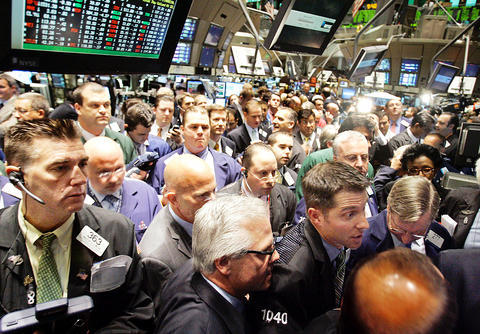After months of hype, hoopla and no small amount of controversy, the Blackstone Group went public on Friday, and with it, lost its "private equity" status.
Its shares, whose symbol is BX -- as in bucks -- was clearly a success. The offering -- priced at US$31, the high end of the expected range -- opened 18 percent higher at US$36.55 and ended trading at US$35.06
The opening was treated almost like a Hollywood premiere at the New York Stock Exchange, where television trucks from networks around the world lined up to report the offering, the biggest on Wall Street and the most high profile since Google went public in 2004.

PHOTO: AP
Blackstone chief executive Stephen Schwarzman, who has attracted much criticism in recent weeks amid the unwanted attention that the stock offering has put on the industry, was not in attendance.
But Tom Wolfe, the author of The Bonfire of the Vanities, was. Walking the floor of the exchange just before the opening, he told a CNBC reporter: "We may be witnessing the end of capitalism as we know it."
Still, the successful offering could presage a wave of followers among private equity firms. Kohlberg Kravis Roberts is considering an offering, as is the Apollo Group.
The stock offering came the same day that more than a dozen Democrats introduced legislation to increase the tax on "carried interest," the performance income earned by many partnerships, including private equity firms. The tax would rise to the ordinary income tax rate of 35 percent, up from the 15 percent capital gains rate now in place. Last week, a bipartisan bill was introduced to increase taxes on firms like Blackstone. Some had speculated that the bill would kill Blackstone's offering or at least lower its valuation, but it appeared to do neither.
Blackstone's offering did not pop the way Fortress Investment Group's offering did in February. That offer surged 68 percent, to US$31, after it raised US$634 million. Those shares have fallen 20 percent since, in part on worries about the possible impact of increased taxes.
With the help of an army of underwriters, 17 in all, Blackstone sold 133.3 million common shares, or a 12.3 percent stake. The company has already sold a US$3 billion nonvoting stake to a Chinese state-owned investment company.
The firm, which started in 1985 with just US$400,000, had a market value of US$38 billion at the close of trading on Friday, giving it a higher market value than more established financial players like Bear Stearns, the investment bank.
No one will reap more from the offering than Blackstone's two founders. With a 24 percent position in the firm, Schwarzman will hold a US$7.7 billion stake and could earn up to US$677 million from the offering's proceeds. That is on top of the nearly US$400 million in compensation he took home last year.
The firm's chairman, Peter Peterson, who is retiring, will earn US$1.88 billion from the offering and will retain a 4 percent stake.

Taiwan Semiconductor Manufacturing Co (TSMC, 台積電) yesterday said that its investment plan in Arizona is going according to schedule, following a local media report claiming that the company is planning to break ground on its third wafer fab in the US in June. In a statement, TSMC said it does not comment on market speculation, but that its investments in Arizona are proceeding well. TSMC is investing more than US$65 billion in Arizona to build three advanced wafer fabs. The first one has started production using the 4-nanometer (nm) process, while the second one would start mass production using the

A TAIWAN DEAL: TSMC is in early talks to fully operate Intel’s US semiconductor factories in a deal first raised by Trump officials, but Intel’s interest is uncertain Broadcom Inc has had informal talks with its advisers about making a bid for Intel Corp’s chip-design and marketing business, the Wall Street Journal reported, citing people familiar with the matter. Nothing has been submitted to Intel and Broadcom could decide not to pursue a deal, according to the Journal. Bloomberg News earlier reported that Taiwan Semiconductor Manufacturing Co (TSMC, 台積電) is in early talks for a controlling stake in Intel’s factories at the request of officials at US President Donald Trump’s administration, as the president looks to boost US manufacturing and maintain the country’s leadership in critical technologies. Trump officials raised the

‘SILVER LINING’: Although the news caused TSMC to fall on the local market, an analyst said that as tariffs are not set to go into effect until April, there is still time for negotiations US President Donald Trump on Tuesday said that he would likely impose tariffs on semiconductor, automobile and pharmaceutical imports of about 25 percent, with an announcement coming as soon as April 2 in a move that would represent a dramatic widening of the US leader’s trade war. “I probably will tell you that on April 2, but it’ll be in the neighborhood of 25 percent,” Trump told reporters at his Mar-a-Lago club when asked about his plan for auto tariffs. Asked about similar levies on pharmaceutical drugs and semiconductors, the president said that “it’ll be 25 percent and higher, and it’ll

CHIP BOOM: Revenue for the semiconductor industry is set to reach US$1 trillion by 2032, opening up opportunities for the chip pacakging and testing company, it said ASE Technology Holding Co (日月光投控), the world’s largest provider of outsourced semiconductor assembly and test (OSAT) services, yesterday launched a new advanced manufacturing facility in Penang, Malaysia, aiming to meet growing demand for emerging technologies such as generative artificial intelligence (AI) applications. The US$300 million facility is a critical step in expanding ASE’s global footprint, offering an alternative for customers from the US, Europe, Japan, South Korea and China to assemble and test chips outside of Taiwan amid efforts to diversify supply chains. The plant, the company’s fifth in Malaysia, is part of a strategic expansion plan that would more than triple